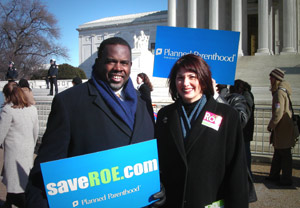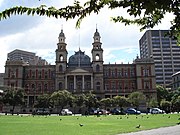Roe v. Wade, 410 U.S. 113 (1973), was a landmark decision of the U.S. Supreme Court in which the Court ruled that the Constitution of the United States protects a pregnant woman's liberty to choose to have an abortion without excessive government restriction. It struck down many U.S. federal and state abortion laws, and prompted an ongoing national debate in the United States about whether and to what extent abortion should be legal, who should decide the legality of abortion, what methods the Supreme Court should use in constitutional adjudication, and what the role of religious and moral views in the political sphere should be. Roe v. Wade reshaped American politics, dividing much of the United States into abortion rights and anti-abortion movements, while activating grassroots movements on both sides.

The United States abortion-rights movement is a sociopolitical movement in the United States supporting the view that a woman should have the legal right to an elective abortion, meaning the right to terminate her pregnancy, and is part of a broader global abortion-rights movement. The movement consists of a variety of organizations, with no single centralized decision-making body.

Abortion laws vary considerably between countries and have changed over time. Such laws range from abortion being freely available on request, to regulation or restrictions of various kinds, to outright prohibition in all circumstances.

The American Center for Law & Justice (ACLJ) is a politically conservative, Christian-based social activist organization in the United States. It is headquartered in Washington, D.C. and associated with Regent University School of Law in Virginia Beach, Virginia.

The Thomas More Law Center is a Christian, conservative, nonprofit, public interest law firm based in Ann Arbor, Michigan, and active throughout the United States. According to its website, its goals are to "preserve America's Judeo-Christian heritage, defend the religious freedom of Christians, restore time-honored moral and family values, protect the sanctity of human life, and promote a strong national defense and a free and sovereign United States of America."
Many jurisdictions have laws applying to minors and abortion. These parental involvement laws require that one or more parents consent or be informed before their minor daughter may legally have an abortion.

The Center for Constitutional Rights (CCR) is a progressive non-profit legal advocacy organization based in New York City, New York, in the United States. It was founded in 1966 by Arthur Kinoy, William Kunstler and others particularly to support activists in the implementation of civil rights legislation and to achieve social justice.
Security of the person is a basic entitlement guaranteed by the Universal Declaration of Human Rights, adopted by the United Nations in 1948. It is also a human right explicitly defined and guaranteed by the European Convention on Human Rights, the Constitution of Canada, the Constitution of South Africa and other laws around the world.

Born in Malta on 12th May 1957, Dr Borg `s legal and political career extends over the past thirty years.

Abortion in South Africa is legal on request in the first trimester of pregnancy, and in special circumstances afterwards. Abortion was legal only under very limited circumstances until 1 February 1997, when the Choice on Termination of Pregnancy Act came into force, providing abortion on demand for a variety of cases.
This is a timeline of reproductive rights legislation, a chronological list of laws and legal decisions affecting human reproductive rights. Reproductive rights are a sub-set of human rights pertaining to issues of reproduction and reproductive health. These rights may include some or all of the following: the right to legal or safe abortion, the right to birth control, the right to access quality reproductive healthcare, and the right to education and access in order to make reproductive choices free from coercion, discrimination, and violence. Reproductive rights may also include the right to receive education about contraception and sexually transmitted infections, and freedom from coerced sterilization, abortion, and contraception, and protection from gender-based practices such as female genital mutilation (FGM) and male genital mutilation (MGM).

The courts of South Africa are the civil and criminal courts responsible for the administration of justice in South Africa. They apply the law of South Africa and are established under the Constitution of South Africa or under Acts of the Parliament of South Africa.
Catherine "Kate" O'Regan is a former judge of the Constitutional Court of South Africa. From 2013 to 2014 she was a commissioner of the Khayelitsha Commission and is now the inaugural director of the Bonavero Institute of Human Rights at the University of Oxford.
The Legal Resources Centre (LRC) is a human rights organisation based in South Africa with offices in Johannesburg, Cape Town, Durban and Grahamstown. It was founded in 1979 by a group of prominent South African lawyers, including Arthur Chaskalson, Felicia Kentridge, and Geoff Budlender, under the guidance of American civil rights lawyer Jack Greenberg, then Director-Counsel of the NAACP Legal Defense and Educational Fund.
The law of persons in South Africa regulates the birth, private-law status and the death of a natural person. It determines the requirements and qualifications for legal subjectivity in South Africa, and the rights and responsibilities that attach to it.

The Choice on Termination of Pregnancy Act, 1996 is the law governing abortion in South Africa. It allows abortion on demand up to the twelfth week of pregnancy, under broadly specified circumstances from the thirteenth to the twentieth week, and only for serious medical reasons after the twentieth week. The Act has been described by the Guttmacher Institute as "one of the most liberal abortion laws in the world".
Public interest law refers to legal practices undertaken to help poor or marginalized people, or to effect change in social policies in the public interest, on 'not for profit' terms.
Section Eleven of the Constitution of South Africa, part of the Bill of Rights, guarantees the right to life. This section has been interpreted to prohibit the death penalty, but not to prohibit abortion. It also has important implications for euthanasia, self-defence, the use of force by law enforcement, and the provision of life-saving healthcare.
South Africa is a secular state, with freedom of religion enshrined in the Constitution.

Abortion in South Korea was decriminalized, effective 2021, by a 2019 order of the Constitutional Court of Korea.










